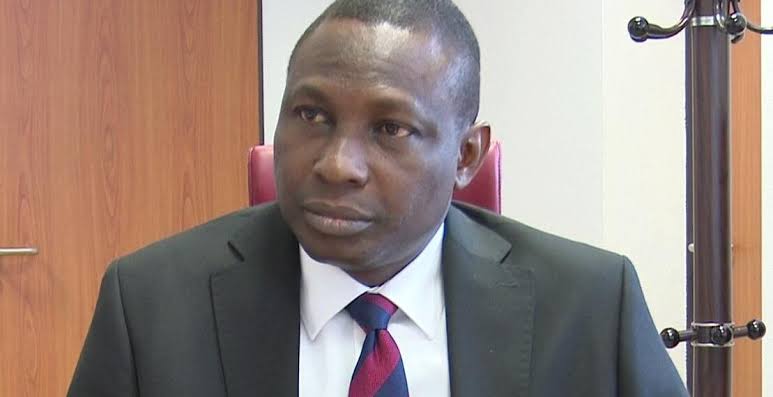
The Economic and Financial Crimes Commission (EFCC) has urged the National Assembly to enact legislation that would criminalise the possession of unexplained wealth in Nigeria.
According to the Commission, the country has managed to fight corruption without a specific law to prosecute public officials whose assets exceed their legitimate income.
EFCC Chairman, Ola Olukoyede, made this appeal on Wednesday at the National Conference on Public Accounts and Fiscal Governance, organised by the Public Accounts Committees of both the Senate and the House of Representatives in Abuja.
Olukoyede also disclosed that the EFCC had only recently begun scrutinising the financial records of the Nigerian National Petroleum Company Limited, and that initial findings have been astonishing.
“Help me pass the Unexplained Wealth Bill. I’ve been begging for the past year. This same bill was thrown out in the last Assembly. If we don’t make individuals accountable for what they have, we’ll never get it right.
“Someone has worked in a ministry for 20 years. We calculate their entire salary and allowances. Then we find five properties — two in Maitama, three in Asokoro. Yet we’re told to go and prove a predicate offence before we can act. That is absurd.
“In the last three weeks, we started a commission-wide investigation into the extractive industry, particularly the oil and gas sector. What we have discovered is mind-boggling. We have only just opened the books. So much more corruption is to be unravelled. If this is what we’re seeing at the surface, imagine what lies beneath,” he said.
The EFCC boss said the discovery underscores how deeply embedded financial mismanagement is across the system, calling fiscal rascality and mismanagement of public resources a core driver of Nigeria’s economic woes and security challenges.
“There is a very strong connection between the mismanagement of our resources and insecurity. When you look at banditry, kidnapping, terrorism, trace it back, and you will find a pattern of corrupt practices and diversion of funds that were meant to improve people’s lives,” he said.
He lamented the legal obstacles that hamper the Commission’s efforts to prosecute suspects.
He explained that investigations into public officials frequently reach a dead end because existing laws demand a “predicate offence” — such as fraud or theft — before assets can be confiscated or charges brought forward.
He further noted that the proposed legislation would introduce strict liability, making it an offence for anyone to hold assets that significantly exceed their verifiable and lawful income.
“Once you are living beyond your means, you should be held to account. Until we do this, there will always be an escape route for the corrupt,” he said.
Olukoyede revealed a disturbing global perception of Nigeria’s looted wealth, noting that the EFCC is currently tracking illicit assets across multiple jurisdictions, from America and Turkey to the most unexpected locations like Iceland.
“Last month alone, I visited four or five countries chasing Nigeria’s stolen assets. An ambassador even told me they discovered an estate in Iceland owned by a Nigerian. Iceland of all places!” he said.
The EFCC boss admitted that no anti-graft agency, no matter how efficient, can recover more than half of what has been looted from the nation’s resources.
“There is no amount of capacity I can build, no level of effort I can put in, that will enable me to recover even half of what has been stolen from Nigeria because the custodians of those assets in foreign countries don’t want to let go. And they won’t,” he said.
Olukoyede also chided hoarders of looted funds, saying, “I told them at the United Nations Forum last December that if you are holding onto Nigeria’s stolen assets, we see you as an accessory after the fact. They grumbled, but I didn’t care,” he said.
He also faulted the widespread culture of impunity in Nigeria’s public service, where those already under prosecution are often celebrated, and compliance with financial laws is flouted with impunity.
“We are doing this work. We see people who have stolen our money. We have shown you evidence. We’ve traced where the money went. We are already in court. Yet, they’re being celebrated all over the place. Does that show we’re serious?
“If we execute even 60% of our capital budget efficiently between 2025 and 2026, we will empower small and medium-scale industries. We’ll build infrastructure. We’ll be fine,” he said.
He emphasised that Nigeria has no business borrowing to survive, given the abundant natural and mineral resources in the land.
“What we need is transparency in revenue generation and accountability in public expenditure,” he said and called on leaders to join hands to address the scourge of corruption, particularly in the public sector.
“If we miss it under this administration, I pity Nigeria. Let’s put politics aside. Let’s put ethnicity aside. This is about rescuing the soul of Nigeria,” he said.








